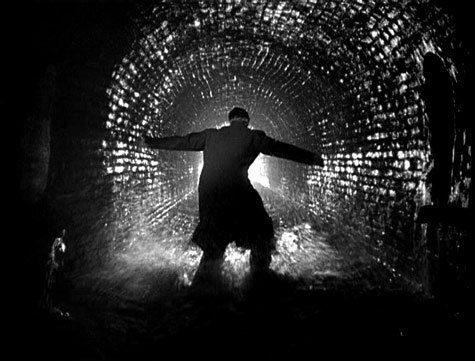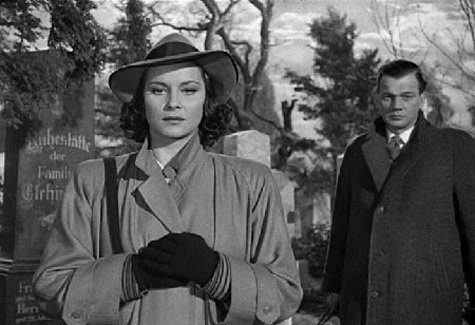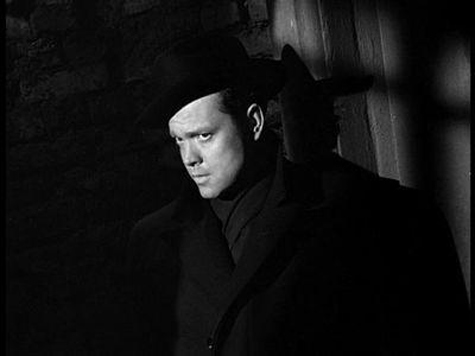
Former loves are sometimes best viewed in memory. Seeing them again after all these years can be depressing (“Could she have really twisted me up so bad?”) and even disillusioning (“OMG, let me out of here!”)
So when I got the restored version of The Third Man (1949) it was with some trepidation that I slid the CD into my computer. (Yes, Virginia, I’m still old school, no streaming videos here. But also because this had comments from Peter Bogdanovich, Graham Greene’s treatment, and other trinkets.)
Yet, because reunions are just that!—a coming together again—those qualities that first mesmerized you, magically capture you once again, and you remember why! Of course, of course.
So with the first notes of Anton Karas’s zither music, you’re transported back in time down on the dark, sinister streets of Vienna, the angles slightly askew and tilted, searching with third-rate Western novelist Holly Martins (Joseph Cotten) for clues to what happened to your good pal, Harry Lime (Orson Welles). And you will meet again, like the film itself, the darks and lights of the city and its chiaroscuro players:
Bernard Lee, who twenty years and forty or so pounds later will play 007’s boss, “M”, is Sergeant Paine, a fan of Martins’s, but not opposed to giving him one on the chin when Holly gets too rambunctious.
Wilfrid Hyde-White is Crabbin, the distracted literary junkie, who, many years later (like Lee, older, wiser and heavier too), will play Colonel Hugh Pickering, the foil to Rex Harrison’s Professor Higgins in My Fair Lady.
Ernst Deutsch, who looks like a menacing two-legged version of the bug-eyed Chihuahua he carries around with him. (“Can’t that dog walk? Yes, but thank goodness he doesn’t have to.”), is Kurtz; odd, fey, and toothy in his fake smiles.
Martins’s antagonist, Major Calloway is played by Trevor Howard, who first appears in a shiny black leather trench coat eerily echoing the SS Gestapo thugs and the mustachioed monster Hitler, who stayed at the famous Hotel Imperial on the Ring, near the Opera.
Alida Valli is Anna, bruised in love by Harry before, but still clinging to his memory.

And finally at sixty-six minutes into it, the namesake himself, Harry Lime, limned in shadows, and at the eureka! moment, illuminated for our eyes. Played by Orson Welles, it is one of the most famous entrances in movie history: The camera’s tight on Anna’s roaming kitty, who grooms herself between a pair of polished shoes. A resident opens a window to shout back at the shouting Martins and viola! the light from her window shines down on the man in those shiny shoes—Harry Lime. Orson etches the moment with an all-knowing smile and … disappears.
Harry’s vanishing, and the other visual tableaux—the three-stories-tall balloon man, the Ferris wheel canted against a darkly metalled sky, the disorienting oblique angles of framing, even the suddenly fatherless little boy, who looks like some real-life Chuckie, leading the pursuit for Holly—are all, like the magician’s sleight of hand, meant to appear without much ado, but are really carefully orchestrated techniques.
Director Carol Reed, leaning in, working head over shoulder with Oscar-winning cinematographer Robert Krasker, maximizes their black-and-white creations to full-color noir. The camera is tilted, some said as a direct influence from Welles and Citizen Kane, but more, I think, to convey that claustrophobic feeling of being in a wide-awake nightmare: careening headlong down dark streets, yelling, pursuing the fleeting object of our desire in tempting, frustrating glimpses.
That Holly Martins is both chasing and being chased at the same time emphasizes the duality of life in those dark and desperate post-war days. Everyone in Vienna is a double-dealer—in forged passports, foreign currencies, and worst of all, in penicillin, so needed for the children dying of meningitis.

The fact that Harry Lime is the worst of these racketeers, his morals in free-fall and his veins flowing with ice-cold Freon when it comes to money underscores this duality. Much like coke dealers “step” on their product to make it go farther, he’s selling diluted penicillin, stolen from the military, and children are dying because the dosages are weakened.
He is a decades-earlier Gordon Gekko. But greed isn’t just good for Harry, it’s his raison d’être. “Look down there,” Lime tells Martins, both of them high above on the Ferris wheel, slowly revolving with the door opened, the threat that Harry would toss Holly so obvious that Joseph Cotten hangs on to the post for, literally, his life. “Tell me. Would you really feel any pity if one of those dots stopped moving forever? If I offered you 20,000 pounds for every dot that stopped, would you really tell me to keep my money, or would you calculate how many dots you could afford to spare?”
Back down on the ground, Harry also gives another speech, written by Welles, deriding Holly’s idealism, that—just like the era and romanticism of his Western novels—is bygone and naïve. “In Italy for thirty years under the Borgias,” he tells Holly, “they had warfare, terror, murder, bloodshed. They produced Michelangelo, da Vinci, and the Renaissance. In Switzerland, they had brotherly love, five hundred years of democracy and peace, and what did they produce? The cuckoo clock.”
The movie’s climax is the harrowing chase through Vienna’s sewers, the even darker, deeper depths to which Harry’s moral decay has sunk, and ends with him grasping helplessly up through a sewer grate at a light he can’t reach. A fitting end for an amoral man who is, in truth, a killer. And even more ironic—the tables turned once again, the duality underscored, when he’s shot by his best friend Holly using the same pistol Harry used on the good Sergeant Paine.
Interestingly enough, Welles threw a hissy (as he did so often in his later, more corpulent years) and refused to do that scene. Director Reed to the rescue: those are his fingers futilely reaching for freedom.
While Reed wouldn’t get an award for Best Digits, he did win the Grand Prize at Cannes, along with the BAFTA Award for Best British Film for The Third Man, completing a BAFTA trifecta, having won it in ’47 for Odd Man Out, and in ’48 for Fallen Idol.
And the hits just kept coming: Karas’s album sold over 300,000 copies in 1949/50; which when you consider how few Brits even had record players, is an astonishing number.
Then there is Harry Lime himself. Much like Pacino’s Michael Corleone, who is the most ruthless of screen men, committing fratricide among his many murders, and yet still able to bask in the glow of the audience’s love, Harry, a well-heeled bastard, was so charming (undoubtedly from Welles’s performance) that he continued on after the film in both radio and television series set in his days before the War. (Maybe one of the first prequels?).
Ultimately, it is this all-star line-up of elements—the actors, the director, the cinematography, the script and yes, that damn music, and of course the real Vienna—gaping bomb craters, buildings with only one wall remaining, mountains of rubble—working together seamlessly, effortlessly, that combine to forge one of those rare films that not only captured movie-goers when it was released, but is still regarded as a classic more than sixty years later. AFI ranks it #57 on its all-time top 100. In 1999 the British Film Institute selected The Third Man as the best British film of the 20th century.
Audiences will forgive a slow opening, but botch the ending and you’ve lost them forever. The last scene in The Third Man almost didn’t happen as filmed. Greene originally, had Holly and Anna walking off into a hopeful future. But Reed insisted on a gritty reality that embodied the city and the people.
So when Holly glimpses Anna walking from Harry’s second and final funeral, he has Calloway let him out of the jeep, which means he’ll miss his flight home, and stands under a tree, waiting for her. But she walks past him, never once glancing his way, and continues walking toward us, closer, ever so closer, and then she is past us, out of frame, out of Holly’s life forever. Holly watches and watches, in a scene that Joseph Cotten kept thinking he’d hear “Cut,” but Reed let run, etching the loss deeper, until finally, Holly lights a cigarette and stares at a future suddenly less rosy. Looking at a lover he’ll remember, now, only in memory.
John Geraci is an award-winning screenwriter who recently turned his talents to fiction. His first novel, Dead Man Talking—a thriller set in a Southern California beach town where the dead bodies are beginning to outnumber the tanned ones—will be released in 2013.
Read all posts by John Geraci at Criminal Element.

Wow — great piece! Now I have to procure a copy of the CD and watch again.
What a wonderful piece on one of the greatest movies I’ve ever seen! Harry Lime’s speech about the Renaissance was one that was oft-quoted in my home (not that my parents shared his ruthless world-view, just that they liked to make fun of the Swiss!)
This is one of my all-time faves, too, and you’re making me itch to pull out the Criterion Collection version we picked up and sink into that velvety blackness again.
Good article. I am a big fan of The Third Man. I’m always overwhelmed at the city of Vienna itself in this film. It’s as much a character as Harry Lime. It’s rare to see a location transmit such power in a movie. Post-war Vienna was so horrible, beautiful, menacing, and broken in Carol Reed’s production. The man was a great film maker.
The word is actually “voilà” – but such is the dark genius of this movie that it warps even the language used to praise it.
One present why galore businesses opt for postcards is because they are overmuch cheaper to be prefab and this can forbear a lot of expenses on the lengthened run.
The Third Man” is a classic film noir that captivates viewers with its suspenseful storytelling and atmospheric cinematography. Set in post-World War II Vienna, the movie follows the enigmatic character Harry Lime and the investigation of his suspicious activities by an American writer. With its iconic zither soundtrack and unforgettable performances, “The Third Man” continues to be celebrated as a cinematic masterpiece. To fully immerse yourself in the world of magic and mystery, check out this link for tips on booking a magician for a Halloween party: